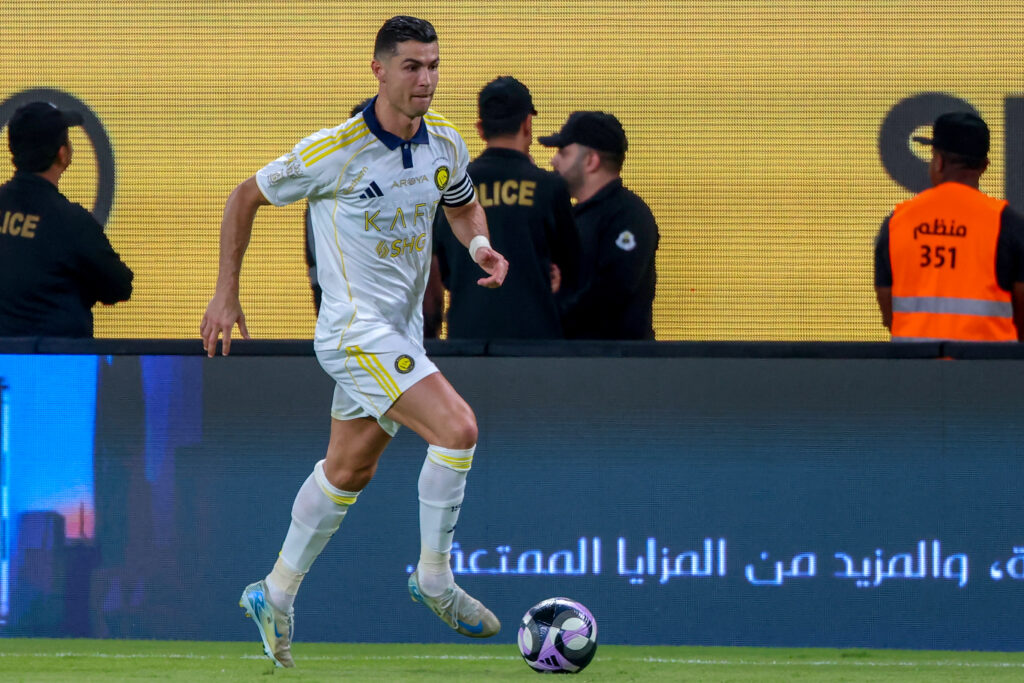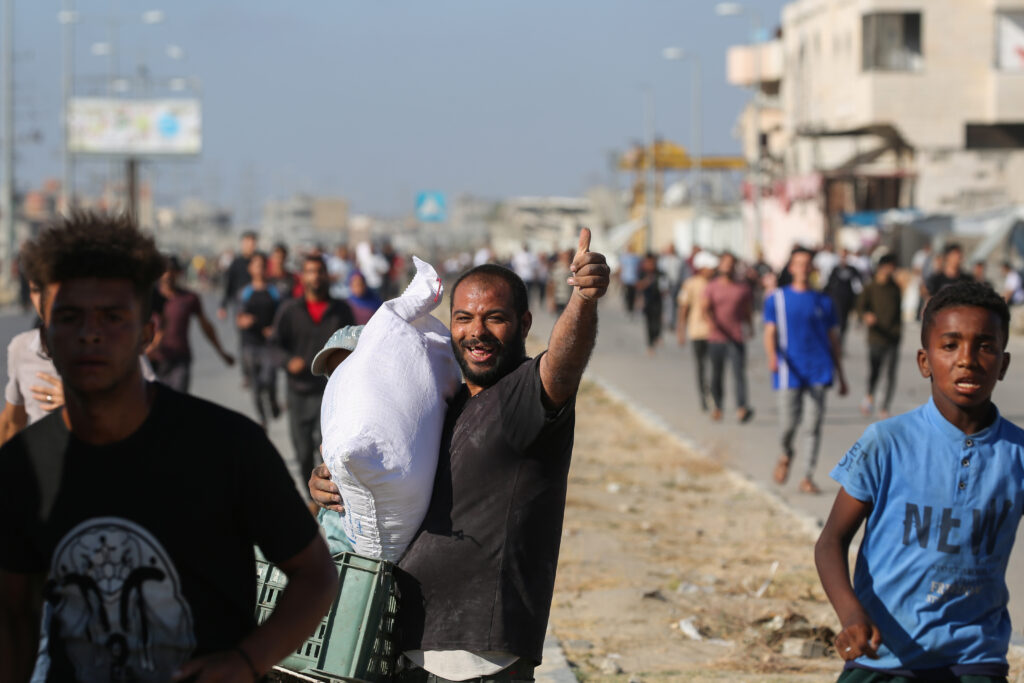AFP Asia Business
Dua Lipa, public figures urge UK to end Israel arms sales
Pop star Dua Lipa joined some 300 UK celebrities in signing an open letter Thursday urging Britain to halt arms sales to Israel, after similar pleas from lawyers and writers.Actors, musicians, activists and other public figures wrote the letter calling on Prime Minister Keir Starmer to “end the UK’s complicity in the horrors in Gaza”.British-Albanian pop sensation Dua Lipa has been vocal about the war in Gaza and last year criticised Israel’s offensive as a “genocide”.Israel has repeatedly denied allegations of genocide and says its campaign intends to crush Hamas following the deadly October 2023 attack by the Palestinian militants.Other signatories include actors Benedict Cumberbatch, Tilda Swinton and Riz Ahmed, and musicians Paloma Faith, Annie Lennox and Massive Attack.”You can’t call it ‘intolerable’ and keep sending arms,” read the letter to Labour leader Starmer organised by Choose Love, a UK-based humanitarian aid and refugee advocacy charity.Sports broadcaster Gary Lineker, who stepped down from his role at the BBC after a social media post that contained anti-Semitic imagery, also signed the letter.Signatories urged the UK to ensure “full humanitarian access across Gaza”, broker an “immediate and permanent ceasefire”, and “immediately suspend” all arms sales to Israel.”The children of Gaza cannot wait another minute. Prime Minister, what will you choose? Complicity in war crimes, or the courage to act?”, the letter continued.Earlier this month, Starmer slammed Israel’s “egregious” renewed military offensive in Gaza and promised to take “further concrete actions” if it did not stop — without detailing what the actions could be.Last September the UK government suspended 30 out of 350 arms export licenses to Israel, saying there was a “clear risk” they could be used to breach humanitarian law.Global outrage has grown after Israel ended a ceasefire in March and stepped up military operations this month, killing thousands of people in a span of two months according to figures by the Hamas-run health ministry.The humanitarian situation has also sparked alarm and fears of starvation after a two-month blockade on aid entering the devastated territory.Over 800 UK lawyers including Supreme Court justices, and some 380 British and Irish writers warned of Israel committing a “genocide” in Gaza in open letters this week.Hamas killed 1,218 people, mostly civilians, in their October 2023 attack on Israel, according to an AFP tally based on official figures.Militants also took 251 hostages, 57 of whom remain in Gaza, including 34 who the Israeli military says are dead.Israel’s military offensive launched in response has killed 54,084, mostly civilians, in Gaza according to its health ministry, displaced nearly the entire population and ravaged swathes of the besieged strip.
Saudis in ‘difficult’ talks to keep Ronaldo next season: PIF source
Saudi officials are in “difficult” talks to keep Cristiano Ronaldo in the country, a source with knowledge of the negotiations told AFP on Thursday, after the star footballer suggested he was leaving Al Nassr.The Portuguese superstar, whose arrival in 2023 heralded a rush of late-career players to the oil-rich country, could transfer to Al Hilal and feature at the upcoming Club World Club, the source said.”There is an ongoing difficult negotiation to convince Ronaldo to stay and play” in the Saudi Pro League next season, said the source from the Public Investment Fund (PIF), a major investor in Saudi football.”First option is a transfer to Al Hilal with an opportunity to feature in the FIFA Club World Cup or to Asia champion Al Ahli,” the source added.The oil-funded PIF, the sovereign wealth fund behind a number of big-ticket Saudi investments, controls a group of Pro League clubs including Al Nassr, Al Hilal and Al Ahli.Ronaldo posted “This chapter is over” hours after the Saudi Pro League wrapped up this week with Al Nassr finishing third and trophyless once again. A special transfer window opens from June 1-10 to allow the 32 teams involved in the newly expanded Club World Cup to sign players.Last week, FIFA president Gianni Infantino said “there are discussions” over the former United, Real Madrid, Juventus and Sporting Lisbon star playing at the tournament in the United States from June 14.Portuguese forward Ronaldo, 40, joined Al Nassr in early 2023 from Manchester United and his contract expires at the end of next month.”Ronaldo’s presence is a key factor in developing the Saudi league in the last two years and a half. He opens the door for elite and young players to come to Saudi Arabia,” the PIF source said. – ‘Ronaldo might play’ -Ronaldo’s announcement comes just months after Brazilian star Neymar ended his injury-plagued 18-month stay in January, after playing just seven times for Al Hilal — on a reported salary of around $104 million a year.Although Ronaldo was the Pro League’s top scorer with 25 goals, he has been unable to win a Saudi or continental trophy with Al Nassr, who lost in the Asian Champions League semi-finals last month.Last year, the five-time Ballon d’Or winner said he could end his career with Al Nassr, the Riyadh team favoured by a number of Saudi royals.Meanwhile, Ronaldo’s great rival Lionel Messi will play at the Club World Cup with Inter Miami.During a recent interview with YouTuber and streamer IShowSpeed, Infantino said: “And Ronaldo might play for one of the teams as well at the Club World Cup.”There are discussions with some clubs, so if any club is watching and is interested in hiring Ronaldo for the Club World Cup… who knows, who knows.”Saudi Arabia has shaken up football by spending heavily on stars from Europe, starting with Ronaldo’s move, and the desert nation will host the World Cup in 2034.
Thousands storm aid warehouse in Gaza as hunger crisis deepens
Thousands of desperate Palestinians stormed a United Nations warehouse in central Gaza on Wednesday, with the World Food Programme reporting two possible deaths in the tumult as Israel and the UN traded blame over the deepening hunger crisis. The humanitarian situation in Gaza, where aid has finally begun to trickle in after a two-month blockade, is dire following 18 months of devastating war. Food security experts say starvation is looming for one in five people.AFP footage showed crowds of Palestinians breaking into a WFP warehouse in Deir Al-Balah and taking bags of emergency food supplies as gunshots rang out.”Hordes of hungry people broke into WFP’s Al-Ghafari warehouse in Deir Al-Balah, Central Gaza, in search of food supplies that were pre-positioned for distribution,” WFP said in a statement on X.”Initial reports indicate two people died and several were injured in the tragic incident,” WFP said, adding that it was still confirming details.Israel accused the United Nations Wednesday of seeking to block Gaza aid distribution, as the global body said it was doing its utmost to facilitate distribution of the limited assistance greenlit by Israel’s authorities.The issue of aid has come sharply into focus amid starvation fears and intense criticism of the Gaza Humanitarian Foundation (GHF), a private US-backed aid group that has bypassed the longstanding UN-led system in the territory.Israel’s UN ambassador Danny Danon told the Security Council that aid was entering Gaza by truck — under limited authorisation by Israel at the Kerem Shalom crossing — and via a “new distribution mechanism developed in coordination with the US and key international partners”.Danon was referring to the GHF operation, which he accused the UN of “trying to block”, saying it was “using threats, intimidation and retaliation against NGOs that choose to participate in the new humanitarian mechanism”.The UN said 47 people were injured Tuesday when thousands of Palestinians rushed a GHF site. A Palestinian medical source reported at least one death.- 600 days -Stephane Dujarric, spokesman for UN Secretary-General Antonio Guterres, reiterated the world body’s opposition to coordinating with GHF. “We will not participate in operations that do not meet our humanitarian principles,” Dujarric told AFP.He said the UN was doing all it could to send aid, adding that since last week 800 truckloads were approved by Israel but fewer than 500 made it into Gaza.As the war entered its 600th day Wednesday, Israeli Prime Minister Benjamin Netanyahu said the offensive had “changed the face of the Middle East”.He said it had killed tens of thousands of militants including Mohammed Sinwar, Hamas’s presumed Gaza leader and the brother of Yahya — slain mastermind of the October 2023 attacks that sparked the Gaza war.Israeli media said Sinwar was targeted by strikes in southern Gaza earlier this month. His brother was killed in October 2024.In Washington, US envoy Steve Witkoff expressed optimism about a possible ceasefire, saying he expected to propose a plan soon.”I have some very good feelings about getting to a… temporary ceasefire, and a long-term resolution, a peaceful resolution of that conflict,” he said.But Gazans remained pessimistic.”Six hundred days have passed and nothing has changed. Death continues, and Israeli bombing does not stop,” said Bassam Daloul, 40.”Even hoping for a ceasefire feels like a dream and a nightmare.”- Elusive ceasefire -Israel stepped up its military offensive earlier this month, while mediators push for a still elusive ceasefire.In Tel Aviv, hundreds of people called for a ceasefire, lining roads at 6:29 am — the exact time the unprecedented October 7 attack began.Relatives of hostages held since that attack also gathered in Tel Aviv.”I want you to know that when Israel blows up deals, it does so on the heads of the hostages,” said Arbel Yehud, who was freed from Gaza captivity in January.”Their conditions immediately worsen, food diminishes, pressure increases, and bombings and military actions do not save them, they endanger their lives.”Out of 251 hostages seized during the October 7 attack, 57 remain in Gaza including 34 the Israeli military says are dead. Some 1,218 people were killed in Hamas’s October 7, 2023, attack, mostly civilians, according to an AFP tally based on official figures.The health ministry in Hamas-run Gaza said Wednesday at least 3,924 people had been killed in the territory since Israel ended the ceasefire on March 18, taking the war’s overall toll to 54,084, mostly civilians.



